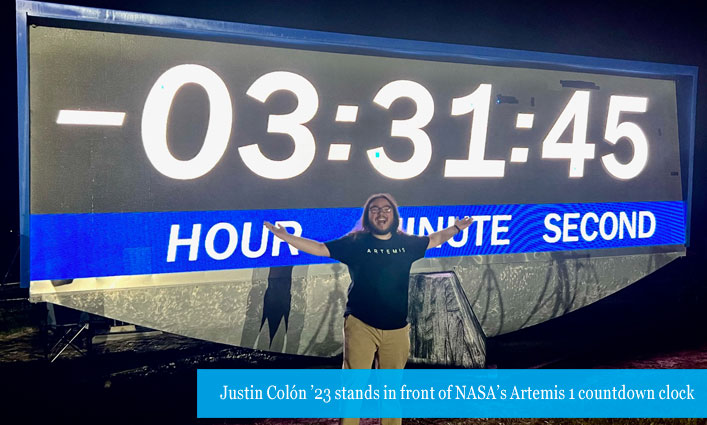
“Seeing the Artemis 1 take off was such an amazing experience,” says Justin Colón ’23, who made a name for himself as @the.justonian on TikTok. His popular science videos earned him an invite from NASA to watch the Artemis 1 launch in November 2022. “It was surreal to see history truly happening in front of me. I’ll always be grateful for being part of this very important, once-in-a-lifetime moment.”
Colón’s account fuses science and entertainment, and shares insights on topics like planets, rock formations, and Batman’s smart contact lenses. “My goal is to share how wonderful science is. Even if science isn’t your thing, I invite you to watch my videos because you do have a stake in science. Whether it’s the climate crisis, building the technology that will allow us to travel to Mars one day, or a body’s immune response to a virus, science is happening all around us,” says the forensic science major.
Joining a Community of Scientists at John Jay
At the College, Colón was excited to take forensic science courses. “John Jay has one of the best forensic science programs in the country. I’m so appreciative of all the encouragement, especially from PRISM and the Office for the Advancement of Research [OAR],” Colon says. “I have the greatest mentors in Dr. Yaverbaum and Dr. Sanabria-Valentín, who do all they can for students to succeed.” PRISM supports the success of science and math students through hands-on research opportunities, sustained faculty mentorship, career development and industry connections. OAR, which funded Colon’s travel to the launch, promotes student and faculty scholarship by raising funds, disseminating student and faculty work, and sharing helpful resources. “We’re so proud that Justin is inspired to share his love and passion for all things science,” says Edgardo Sanabria-Valentín, Ph.D., associate director of PRISM.
“I have the greatest mentors in Dr. Yaverbaum and Dr. Sanabria-Valentín, who do all they can for students to succeed.” —Justin Colón ’23
Colón was also bolstered by the diversity that surrounded him, especially in his science courses. “One of the most unique things about John Jay is that there’s real equity here. In the STEM field it’s rare to see Black, Latinx, women, and members of the LGBTQ+ community. Our STEM classrooms are diverse.”

Artemis 1 rocket at the Kennedy Space Center
Interning at the American Museum of Natural History
It was an email from Sanabria-Valentín that led to an unforgettable experience for Colón during the 2021-2022 academic year. “Dr. Ed regularly sends students emails with internship and experiential learning opportunities, and suggested I apply to the American Museum of Natural History’s (AMNH) Museum Education and Employment Program (MEEP). I got the internship, and it was an absolutely amazing experience,” says Colón. “I worked in the Halls of Gems and Minerals and Hall of Planet Earth where I met with groups of visitors and educated them on the pieces we had in the halls. Being able to have these conversations, discuss the science behind their formations, no matter how small, really brought the hall to life.”
Witnessing his passion for teaching others, fellow interns and staff at the museum encouraged Colón to create a TikTok account. “They complimented me on my interactions and conversations with visitors and suggested I join the platform to share my love of science,” recalls Colón. “At first I was hesitant because I thought people only danced on TikTok, but then I learned there were people posting science content, so I threw my hat in the ring.”
Creating Space for Marginalized Communities
Colón’s ability to make science approachable isn’t just happening on TikTok. As part of his PRISM research project, he’s promoting physics education to underserved and underrepresented communities. “Through this project, we’re creating a comic book that will help readers of all ages and backgrounds understand the basic concepts of physics. We’re removing the jargon that can sometimes scare people away and making it easy and fun to understand,” says Colón. “We also wanted to show how science can be a diverse field. Our main character is a non-binary Latinx superhero, who comes to understand their superpowers through science. I hope it inspires readers of all ages to participate in STEM.”

Colón with NASA astronaut Randolph Bresnik
“To improve as a society, whether that’s in scientific achievements or simply moral growth, we need to question everything. Like justice, science is about finding what’s right.” —Justin Colón ’23
Looking to the Future
“Science has given me so much in life,” says Colón. “It’s provided me with amazing opportunities, deepened my appreciation of everything around us, and made me a stronger advocate. The most important thing it has taught me is to remain curious and always ask questions. To improve as a society, whether that’s in scientific achievements or simply moral growth, we need to question everything. Like justice, science is about finding what’s right.”



